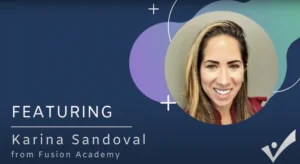How does music help students with ADHD?
- Tracy Habig
- February 6, 2023
Did you know that humans created music before they started to use language? Our brains light up with activity when we listen to music! This article released by Harvard University explains, “music can activate almost all brain regions and networks, it can help to keep a myriad of brain pathways and networks strong, including those networks that are involved in well-being, learning, cognitive function, quality of life, and happiness.” So basically, music is a tool for enhancing the performance of the same brain functions that can be negatively impacted by ADHD. Many students with ADHD find that listening to music can help them focus, as well as reduce symptoms like low motivation or racing thoughts. It can change your overall mood!
Now, let’s dig into how this really works.
One of the main benefits of music for students with ADHD is its ability to provide a consistent, background sound that can help to drown out distractions. We all know that one of the main symptoms of ADHD can be struggling with focus. Having some background noise can be a simple yet effective concentration tool. The rhythmic and repetitive nature of music helps soothe and calm the brain. We could all use a little of that! This doesn’t just apply to students with ADHD! This will help anyone!
You may be wondering, “Well, Tracy, what about the type of music? I can’t write my English paper and listen to my favorite hip-hop song! It’s almost more distracting.” Good point. While the type of music that works best for people with ADHD will vary depending on the individual, there are specific characteristics of music that can be particularly helpful. Music with a consistent and steady beat, music with minimal lyrics, and music with a slower tempo can all be effective in helping to focus and relax the mind. Keep these points in mind when picking your focus playlist!
Lastly, music can help you create more structure while completing tasks. For example, listening to music while working on a project can help you break it down into smaller, more manageable chunks, making it easier to complete ( “I’m going to research some sources, just while this song is on!”). This can be especially helpful for those who find it difficult to stick to a schedule or plan
Would you like to try it out for yourself? You can! To help our students with ADHD, we have created FREE focus playlists, available now on Spotify! Find the one that works best for you and enjoy!
Music Source about language coming after music: https://www.psychologytoday.com/us/blog/your-musical-self/201209/which-came-first-music-or-language#:~:text=Music%20came%20FIRST.,a%20special%20type%20of%20music.
How Music Activates every part of the brain: https://www.health.harvard.edu/blog/why-is-music-good-for-the-brain-2020100721062#:~:text=Music%20activates%20just%20about%20all%20of%20the%20brain&text=The%20parts%20of%20the%20brain,music%20activates%20the%20motor%20system.

Thrivister Curriculum and Content Coordinator
Tracy has an extensive background in school management and operations. Her position as “Head of School” at a nationwide academy deepened her expertise in supporting students who learn differently. Just like Thrivister, Tracy knows how much a student can accomplish with the right support. Tracy joined Thrivister in the Spring of 2022 and is currently a valued member of our Marketing and Operations team where she specializes in content and curriculum management. You probably recognize Tracy from our Parent’s Academic Success Course and our social media too!

7 Trailblazing Celebrities and Icons Living & Thriving with ADHD
Explore the inspiring journeys of 7 influential individuals who have harnessed their ADHD to achieve greatness and make a lasting impact.

Unveiling the Complexities of ADHD: Insights from Dr. David Pomeroy
Unveiling the Complexities of ADHD: Insights from Dr. David Pomeroy https://youtu.be/EotABukIxlo Attention Deficit Hyperactivity Disorder (ADHD) is a multifaceted condition that impacts millions of lives

Navigating ADHD in Teens: Insights from MFT, Kelsey Thompson
Navigating ADHD in Teens: Insights from MFT, Kelsey Thompson https://youtu.be/omQndscdD5U In a recent interview with Kelsey Thompson, a seasoned Marriage and Family Therapist at The

Unlocking Potential: A Glimpse into Fusion Academy’s Personalized Education Model
Unlocking Potential: A Glimpse into Fusion Academy’s Personalized Education Model https://youtu.be/R7BgYW6A6k4 In the bustling world of education, where traditional models often struggle to meet the

